The number of Minnesotans turning 65 in this decade (about 285,000) will be greater than the past four decades combined, and by 2030 more than 1 in 5 Minnesotans will be 65 or older.
Whether we're students, educators, researchers, or caregivers, there is no doubt that aging affects us all. Across the health sciences, we're training a workforce, as well as community members, to care for older individuals and communities through:
- The MN Northstar Geriatrics Workforce Enhancement Program (MN GWEP), which has created a comprehensive repository of educational resources to teach age-friendly care.
- The Institute on the Biology of Aging and Metabolism conducts collaborative and transdisciplinary aging research and teaches the next generation of experts in the biology of aging.
- Dementia Resources from MN GWEP, including Dementia Educational Experience Roadshow (DEER), an educational program that offers critical skills training and education for caregivers, families, communities and health professionals; dementia Q&A webinars, and Dementia Friends, which offers interprofessional learning opportunities for students and opportunities for community outreach.
- The Caring for People with Memory Loss Conference on June 4, a lively, informative discussion related to memory loss, caregiving tips, and what you can do to help. This event is free and open to the public.
- Age-Friendly University Day on June 20, a day filled with discussions on finding purpose in life, age-friendly communities, and dementia.
- The Interprofessional Geriatric Case Competition, a unique opportunity for graduate and undergraduate students from multiple disciplines and schools at the University to come together as a team to develop a comprehensive, interprofessional plan of care for an older adult.
We are all confronted with learning to care for older loved ones and considering our own futures as we age. It is important for Minnesota that this University has many experts, programs, and resources ready to help.
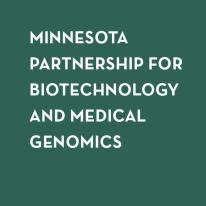
Driving Innovation and Discovery
MN Partnership for Biotechnology & Medical Genomics: Research Grant Program Now Open
The Minnesota Partnership for Biotechnology and Medical Genomics is a state of Minnesota funded initiative that provides support for innovative research conducted by collaborative teams from the University of Minnesota and Mayo Clinic. This is a yearly funding opportunity that provides support for innovative research proposals across the entire spectrum of biomedical and health care research. The application must be a joint project that requires collaboration between the two institutions, that could otherwise not be conducted individually. LOIs due June 10.
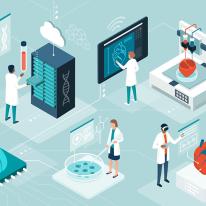
Strategies for Managing Your Research Team
Do you feel overwhelmed by the burden of managing a research team or multiple different projects? In this workshop led by the Clinical and Translational Science Institute, you will learn different strategies for managing your research teams that may be implemented to support your research programs. Learning objectives include discussing different key takeaways to design, to manage, and to evaluate research progress, overall scientific objectives, and practice on how to customize some of the frameworks in your own research programs.
Advancing Interprofessional Education and Training
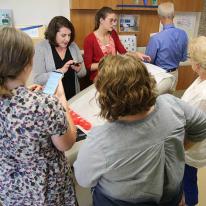
Call for Applications: New CIH Faculty Affiliate Role
The Center for Interprofessional Health welcomes faculty affiliates with a demonstrated interest in interprofessional education, practice, or research. Faculty, staff, and community-based health professionals accepted into this one-year (Aug. 1, 2022-May 31, 2023) program will participate in interprofessional learning and dissemination opportunities. Applications are due by June 10.
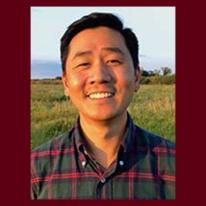
Students: What Do You Enjoy Most About Interprofessional Activities?
“I love that interprofessional activities allow us to live outside of our heads, if only for a moment. As we develop technical and clinical knowledge, I think it is easy to forget how overwhelming and foreign everything seemed prior to undertaking our training. Engaging in conversation with those in other health professions brings to light the particular jargon and narrow modes of thinking that are particular to our respective disciplines. Taking a moment to consider this gives us the opportunity to ensure our approach in clinics and hospitals reflects not only ‘the physician’s recommendation’ or ‘the therapist’s plan,’ but instead represents a cohesive, multidisciplinary strategy.” - Marvin So, medical student
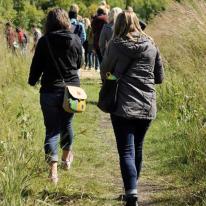
Global Health in Local Contexts – Apply by May 31
Applications are now open for the Center for Global Health and Social Responsibility's fall 2022 course "Global Health in Local Contexts." This course uses an interprofessional and experiential model – the course is "classroom-less" and entirely held in community settings in the Twin Cities. Students will also engage in co-learning with peers in Uganda and Haiti enrolled in parallel courses. Open to U of M graduate students and community learners; credit and non-credit registration options available.
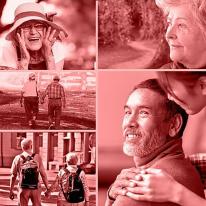
Educational Resources on Urinary Incontinence
The Minnesota Northstar GWEP is offering free learning resources for urology professionals, educators, preceptors, and care providers. Check out the new, peer-reviewed toolkit, Managing Urinary Incontinence in Older Adults, which provides educators with interprofessional resources for teaching introductory aging content. This material is appropriate for undergraduate- and graduate-level learners. Check out the MN GWEP website to see several geriatric education toolkits.
Partnering with Communities
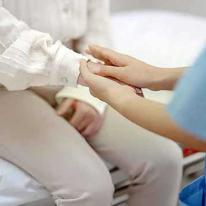
First-of-its-Kind Trauma-Informed Care Simulation Series Will Help Train Sexual Assault Nurse Examiners Across Minnesota
M Simulation recently piloted a new training on trauma-informed interviewing to help prepare sexual assault nurse examiners (SANEs) to care for patients who have experienced sexual assault or abuse. The pilot training also aims to advance transgender health care. The simulation training is part of the Advanced Nursing Education-Sexual Assault Nurse Examiners program, which aims to double the number of SANEs in Minnesota, particularly in rural and under-resourced communities.
U-Wide Events and Opportunities
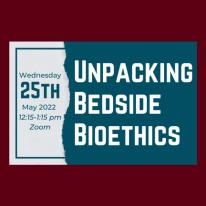
Unpacking Bedside Bioethics: Demystifying Decision-Making Capacity
Join the Center for Bioethics for their new clinical ethics professional development series where bioethics core and affiliate faculty introduce foundational bioethics concepts, identify ethical dilemmas in clinical cases, and demonstrate how to apply bioethical frameworks to resolve those dilemmas. This interprofessional series is geared towards physicians, nurses, pharmacists, chaplains, social workers, and other clinical staff. Health professions students are also encouraged to attend.



